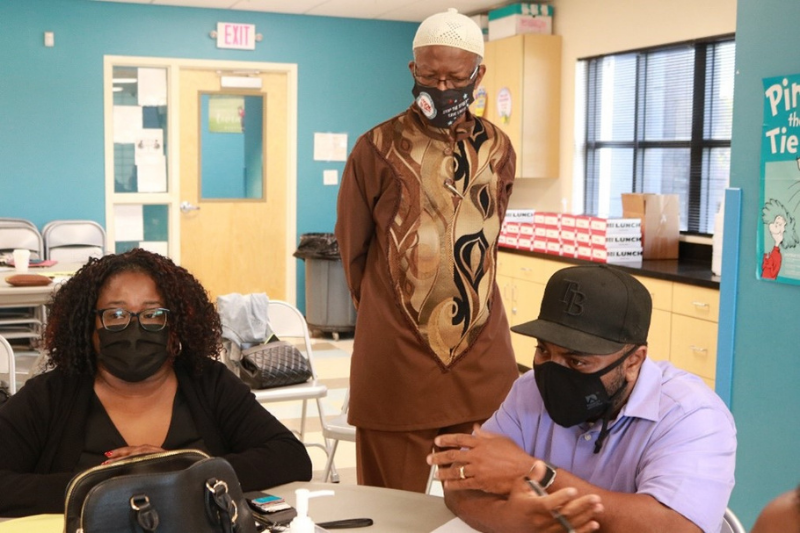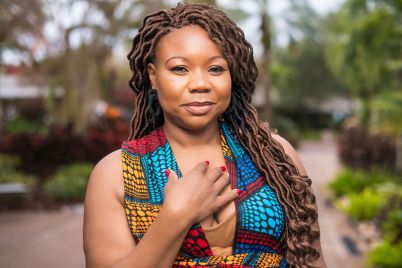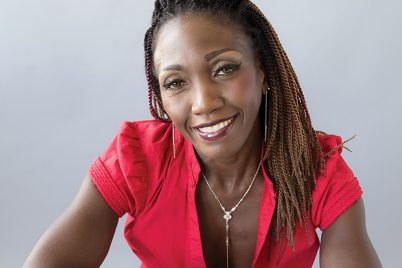‘Messages to young adults should focus on this hope, not with a single focus on vaccinations, but the on health in a larger sense,’ said Imam Askia Muhammad Aquil, who serves as Chairman of the CEGTBA board of directors and ITTS campaign director.
ST. PETERSBURG — The atmosphere was charged and buzzing with nervous energy as 10 influential young adults, along with event organizers and facilitator Loretta Monroe Calvin, arrived Nov. 20 at the Campbell Park Recreation Center to discuss the impact of the COVID-19 pandemic on local community health.
Kyandra Darling, grants program manager for the Foundation for a Healthy St. Petersburg (FHSP), welcomed the group and briefly explained the active role that she and the Foundation are playing in focusing attention on the serious threat to the health of young adults and other age groups posed by COVID.
Darling said the Young Adult Charrette was unique because it was the first setting she knew of where the youths in St. Petersburg were convened to be heard and not merely lectured to about wearing masks, vaccination mandates, social distancing, etc.
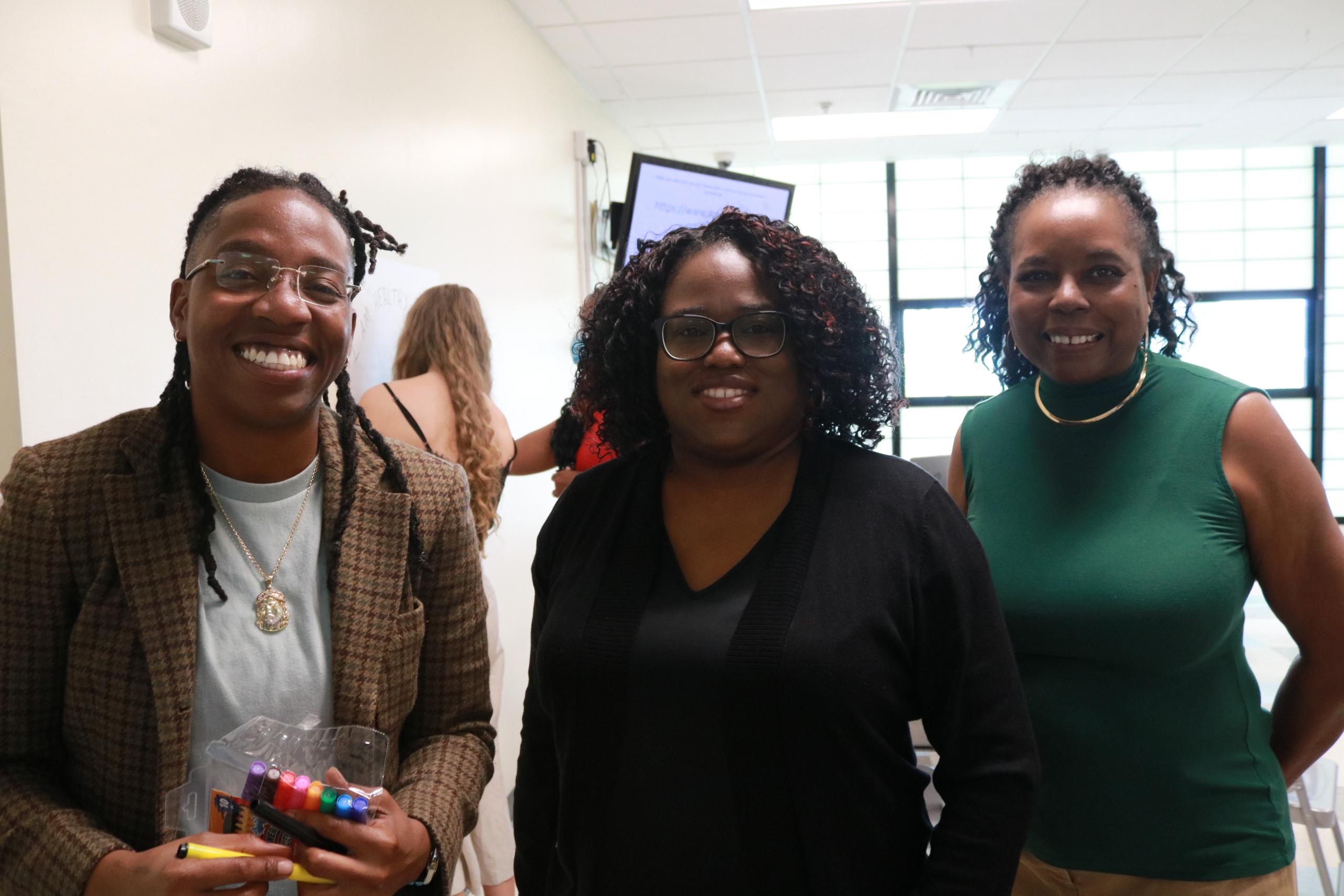
Mhariel Summers, Demetrious Taylor, and Dr. Katurah Jenkins-Hall
Six female and four African-American male influencers gathered to do this vital work for the charrette. Ninety percent of the participants had a family member or close friend officially diagnosed with COVID. Eighty percent wear masks inside most of the time, and 50 percent wear masks outside most of the time, and more frequently if required.
Six out of 10 of the young adults had been vaccinated. Even those vaccinated expressed hesitancy primarily because no one knows the effects of the vaccination over a long period of time.
The Young Adult Charrette was planned and organized by the “I Took The Shot!” (ITTS) team of the local faith-based nonprofit the Collective Empowerment Group of the Tampa Bay Area, Inc. (CEGTBA).
ITTS team members include former Pinellas County Health Department employee Mamie Slaughter and Vannetti Carter, who previously worked in St. Petersburg City Hall.
“In response to the ravaging disproportionate impact of COVID on our families, businesses, and normal lives, we temporarily shifted from our main mission of collaborating with faith leaders and others to bring about collective economic empowerment to assist the community in mitigating the effects of COVID-19,” said Imam Askia Muhammad Aquil, who serves as Chairman of the CEGTBA board of directors and ITTS campaign director.
“A charrette is a working session to harness the best thinking of interested parties representing all sides of the issue,” said Dr. Katurah Jenkins-Hall, a community faith leader and volunteer with the CEGTBA ITTS Campaign. “We chose these young adult influencers from our community to participate in this exciting learning opportunity, acknowledging that there are different views about vaccinations, mask-wearing, testing, and other prevention strategies as the world, the United States, Florida, and our city battle with this deadly unexpected emergency.”
Dr. Jenkins-Hall continued. Dr. Jenkins-Hall is also a licensed clinical psychologist who has spent over 30 years teaching on the college and university level.
CEGTBA used its broad network of faith and other community leaders to secure resources to launch Mask-up St. Pete!, a campaign that encourages wearing face masks. The campaign distributed over 65,000 free masks plus thousands of educational flyers, hundreds of t-shirts, and yard signs.
Funded by the FHSP, the CEGTBA and its ITTS campaign collaborated with many other groups and agencies involved with the “Beat COVID Pinellas” initiative in messaging to and motivating African-American residents 65 and older who live and work in zip codes 33712, 33711, and 33705 to get vaccinated.
As the information and knowledge about the COVID-19 rapidly evolved, it soon became apparent that people in the 65 plus age group were at risk primarily because of their exposure to unvaccinated infected younger adults, according to most research studies. Concurrently, the ages of those eligible for vaccinations quickly decreased from week to week such that the current focus of ITTS is on young adults ages 18-30.
Ironically, results from a survey of the charrette participants verified that though they are the most likely spreaders, young adults are the most hesitant for vaccinations.
Nearly 90 percent of the young adults believed that to be or not to be vaccinated is a matter of individual choice. Only 40 percent believed that mask wearing should be a choice. More importantly, the participants believed that young adults know the risk they are taking.
The entire room was able to state the pros of wearing masks: Mask wearing protects you and others from COVID-19, feels safer in public spaces, and also protects from cold, flu, and other illnesses. The discussion of cons was lighter, centering around inconveniences. There was also a general concern for the environment—masks are randomly disposed of and are seen everywhere.
However, when the discussion shifted to vaccinations, the pros and cons were more sensitive.
Not everyone is eligible to receive the vaccination; for example, it may not be indicated medically, or may be against one’s religious beliefs. There remain questions regarding the effectiveness of vaccinations, especially when one considers known stories of breakthrough cases, media emphasis on mutated strands, and other anomalies.
There were also concerns about what may be “endless booster shots.” Long-term side effects are still being questioned, such as the effect on future fertility.
Many real-life considerations are at hand when companies or institutions require fees for unvaccinated students, vaccination passports, and impose travel restrictions. People also must weigh if they will work for a place that requires vaccinations.
For many, requiring vaccinations is an infringement on personal rights, for example, the right not to disclose medical records. Political infringements such as the inability to sue Big Pharma were also discussed.
Still, there are social consequences for others — vaccinated people are not as likely to wear masks. Sometimes, within the same household, there are perceived social pressures to become vaccinated. Being vaccinated adds very little to practical advantages that help us get back to normal for some. For example, requiring one to quarantine if exposed, despite being vaccinated.
Yet, most understood the overwhelmingly positive impact of vaccinations, including
increased immunity, reducing symptom severity and Covid related hospitalizations and deaths, a quicker return to normalcy after “herd immunity is reached, which will include less restricted travel, less mask-wearing mandates, and overall, less stress and anxiety.
There is hope with the right approach to vaccinations. “Messages to young adults should focus on this hope, not with a single focus on vaccinations, but the on health in a larger sense,” said Aquil.
Our future messaging will include these critical takeaway concepts: Remain open, do your own research, consult your physician, focus on staying healthy, and know your health is your wealth! The ITTS campaign is grateful for Charrette participants who contributed to this messaging.
As an influencer, what do you tell a young adult about staying healthy as it relates to COVID-19? Participants said:
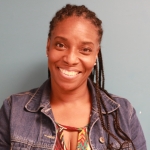 La Tonya Nikki Hill, PCS educator
La Tonya Nikki Hill, PCS educator
“Vaccinations have been mandated since your birth. Polio and other fatal childhood diseases were eradicated by vaccines. I understand your hesitancy, but you should consider how you may impact your parents, grandparents, and other loved ones who may have weakened immune systems.” La Tonya Nikki Hill, PCS Educator
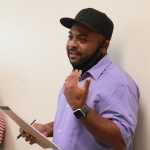 Bro. John Muhammad, community organizer
Bro. John Muhammad, community organizer
“Get as much information as you can and trust yourself to make the decision you feel is in the best interest of you and your loved ones.”
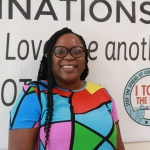 Sheryl Henry, licensed mental health counselor
Sheryl Henry, licensed mental health counselor
“Consider the effects of getting COVID vs. the effects of taking the vaccine. I would highlight not just the impact on themselves but also the impact on our larger community & how getting vaccinated helps to keep us all safer.”
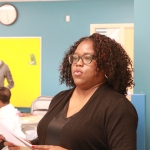 Demetrius N. Taylor, PCUL Young Adult Professional
Demetrius N. Taylor, PCUL Young Adult Professional
“COVID-19 has life-altering consequences that are equally as devastating as medical side effects. If you contract the virus, it will impact your ability to work, get paid, and support your family.”
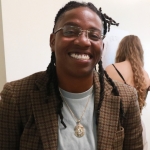 Mhariel Summers, political activist
Mhariel Summers, political activist
“As you decide, be respectful to others and wear a mask! Don’t remain undecided forever, be intentional about educating yourself.”
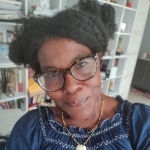 JakeAnn Jones, Managing Editor, TWC
JakeAnn Jones, Managing Editor, TWC
“Wear your mask, if you’re very susceptible talk to a doctor about getting vaccinated, avoid crowds, get tested as soon as you have worrisome symptoms, pay attention to the latest reports, do your research, take vitamins and supplements, drink water, eat less junk food, get adequate rest.”
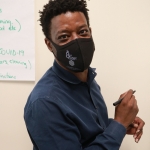 Jabaar Edmond, President, PCUL Young Adult Professional
Jabaar Edmond, President, PCUL Young Adult Professional
“Know your own health status and the status of those around you.”
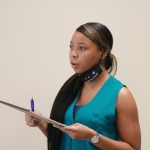 Ashley Aquil, PCS Educator
Ashley Aquil, PCS Educator
“Do your own research.”
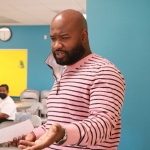 Sergio Curry, City of St. Petersburg
Sergio Curry, City of St. Petersburg
“Consult your doctor.”
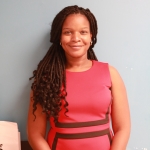 Caprice Edmond, PCS Board Member
Caprice Edmond, PCS Board Member
“Ask them, what do they do to stay healthy?”

